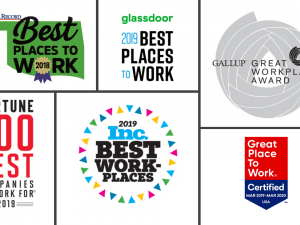
Have you seen a movie depicting a riveting moment when the bad guy shoots a window in a large airliner flying at a high altitude? Suddenly, there’s a huge sucking sound and unsuspecting passengers are pulled through a hole in the fuselage and into the atmosphere. One moment there are 200 passengers on the plane and seconds later very few remain on board, except the person using the bathroom. Hollywood is good at scaring the traveling public.
Sudden Exits
Speaking of sudden exits, when the job market improves, most companies will find themselves with a gaping hole in their retention strategy. When the economy recovers, the best talent of average organizations will be sucked out the front door and into companies with employee-friendly work environments. Employee engagement rates are at their lowest while finance-focused CEO’s are oblivious to the most important game-changing corporate strategy to separate winners from the losers – a positive company culture.
Consider the following mistakes many CEO’s make that cause talent to take the leap:
#1 Layoffs Used to Appease Shareholder Gods
When companies use layoffs as their first strategy to cut costs, it sends a message of panic to the remaining employees. CEO’s are broadcasting to everyone they don’t care about people enough to try other cost-cutting measures before lopping off heads and turning them out to the unemployment line. The chief executive does not conduct the firings and does not hear the laid-off employees’ worries about mortgages, car payments, college tuition costs for their children, etc. For publicly traded companies, layoffs are used as a sacrifice to appease the shareholder gods. Layoffs should be the last resort to cost-cutting, unless you want to be known as a heartless company. Losers rely on layoffs.
#2 Mission Statements Are Meaningless
People like to know where their company is going and why. Yet, many CEO’s don’t find it necessary to explain the reason it’s important to work for their firm. Without a well-defined mission, corporate life exists merely as a meandering waste land where 5:00pm is the daily goal. Professional football teams have their eye on the Super Bowl. Baseball teams possess a laser-focus on the World Series. Hockey teams dream of winning the Stanley Cup. Your organization’s pursuit should not be to simply make more money. Your people need a mission that aligns everyone towards a common goal, followed by a vision for the future and values that describe how employees, customers and vendors are to be treated. Without a mission, companies are missing in action.
#3 Jerks Considered Promotion Material
Do you allow jerks to continue working at your company? Granted, all of us are capable of being a jerk on a bad day or weak moment. However, I am referring to the certifiable, 24/7, kind of jerk. If your company promotes jerks into management, this is a huge warning sign of impending talent loss. Baby Boomers were taught to be tough and endure all manner of mistreatment. Generation Xer’s and Millennial’s, however, will find a better place to work because they watched their parents endure the brutal side of corporate life only to be laid-off once, twice or even three times during their careers. The younger generations observed the stress and strain on their parents while they worked in toxic work environments that had little regard for the sanctity and responsibility for people. Jettison the jerks or your best talent will gladly abandon ship when the economy improves.
#4 Bad Bosses Make Good Leaders
Have you heard the saying, employees don’t leave companies, they leave managers. Actually, people leave companies who promote and employ lousy leaders. It is difficult to continue discovering creative ways to maneuver the minefields set by bad leadership. How many times can you attend the seminar, “Working for a Bad Boss without Losing Your Mind.” Bad bosses cause increased rates of absenteeism, high blood pressure, mental health issues, fatigue, workers’ compensation claims, and much more. What they don’t cause is increased productivity. When your leaders are lousy, employees will find the nearest exit.
#5 Flexibility is a Nice Word for Lazy
Bosses are having a hard time with this topic: Flexible Workplace. For average companies, workplace flexibility means employees get to leave thirty minutes early on Friday provided they show up thirty minutes early. These managers believe flexibility is another word for lazy. That scenario may have worked in the 1990’s. With today’s digital workplace, employees are connected to the Internet all hours of the day. It doesn’t matter where we go, we are connected to the office. Outdated managers, however, want people to have their butts in seats 40 hours/week, regardless that they are connected remotely day and night, seven days/week. If this is your management philosophy towards flexibility, when the economy improves, plan on losing your best talent to companies who offer innovative approaches like the Results-Oriented Work Environment. It’s called ROWE. This workplace model is being used today by a growing list of employee-friendly companies. These companies have experienced, on average, a 40% increase in productivity. ROWE allows employees to work anywhere or anytime, as long as the work gets done. ROWE is all about results. In fact, all meetings are optional and includes unlimited vacation. This workplace is more than flexibility, it is the 21st Century’s organizational revolution.




